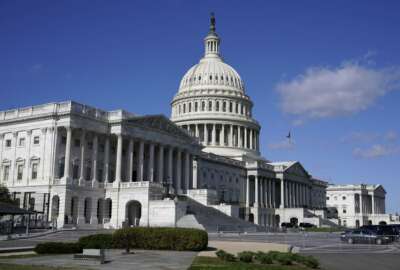To listen to the Federal Newscast on your phone or mobile device, subscribe in PodcastOne or Apple Podcasts. The best listening experience on desktop can be found using Chrome, Firefox or Safari.
- Congress wants more transparency about the use of Other Transaction Authority in Defense spending. OTAs bypass most of the traditional rules in the acquisition system, and with the Defense Department making awards through industry consortia, the public usually doesn’t know which specific vendor is being paid, and what kind of work they’re doing. A provision in the new Defense authorization bill would require the department to post a public listing of all the consortia it uses to make awards. It also demands a report to Congress on how often DoD uses consortiums, how many dollars flow through them, and the benefits and challenges of doing business that way.
- It appears President-elect Joe Biden will be nominating retired four-star Army Gen. Lloyd Austin as his secretary of defense. The Associated Press reported four people close to the decision have confirmed the pick. Austin would need to obtain a congressional waiver as he would not have been out of uniform at least seven years before serving as secretary of defense. He would also be the first Black leader of the Pentagon, ever. Previously, Austin served as vice chief of staff of the Army and the head of U.S. Central Command. (Federal News Network)
- Some Democratic members of Congress want to block President Donald Trump’s nominee to fill an opening on the Federal Communications Commission. One of them, Sen. Richard Blumenthal (D-Conn.), said putting Nathan Simington on the FCC would undermine the agency’s independence and could potentially deadlock the agency. Still, reports indicate Majority Leader Mitch McConnell (R-Ky.) has filed a cloture motion to end debate on Simington’s nomination. The FCC opening comes as the seat will be vacated by Commissioner Michael O’Reilly.
- The House will vote tomorrow on a one-week continuing resolution. The temporary measure would keep the government open through Dec. 18. Congressional leaders insist they want to avoid a government shutdown. Some agencies have new shutdown contingency plans anyway to account for the pandemic. The Department of Health and Human Services said it’ll use multi-year funding and user fees to keep much of the Centers for Disease Control and Prevention, Food and Drug Administration and National Institutes of Health working to support the COVID-19 response. (Federal News Network)
- A Trump veto of the 2021 defense authorization bill could put service member pay and benefits in jeopardy. Lawmakers said they are trying to keep that from happening. Top legislators said this week that they are willing to call a special session of Congress at the end of the year to override a possible veto of the defense authorization bill. The legislation is a massive policy bill that includes a 3% increase in pay for service members and authorizes military construction projects. Trump has threatened to veto the bill because it provides for renaming military bases memorializing Confederate officials. He also said he would veto the bill if Congress does not add a provision repealing some protections for tech companies. Lawmakers said they most likely have the votes to override Trump’s rejection of the bill. (Federal News Network)
- The Department of Veterans Affairs said it’s finished the IT upgrades needed to administer education benefits under the Forever GI bill. The Veterans Benefits Administration initially had to partially delay the bill’s implementation because of challenges with its legacy IT systems. But VA said the Mitre Corporation and Accenture helped the department make the necessary IT changes. It means VBA can now properly calculate housing benefits for post-9/11 veterans. The IT project is the first of many steps needed to modernize the way VA interacts with student veterans.
- Agencies have to do more to make sure Chinese-made telecommunications products aren’t bought with federal funds. The Office of Management and Budget released new frequently asked questions explaining how agencies should make sure grantees are not using prohibited Chinese-made telecommunications equipment. Under Section 889 of the 2019 Defense authorization bill, starting in August agencies could no longer enter into any agreements where the contractor or grantee used certain Chinese-made telecommunication products or services. The FAQs help add some clarity for grant-making agencies. One big difference between contractors and grantees is grantees cannot ask for waivers from the regulation. (Performance.gov)
- Defense contractor Northrop Grumman is getting out of the federal IT and mission support services business. The defense giant is selling that business unit to Veritas Capital for $3.4 billion in cash. Northrop’s IT and mission support unit provides a wide range of advanced technology services including cybersecurity, data analytics, cloud, mission-critical application development and advanced engineering. The business expects to generate $2.3 billion in revenue in 2020. Veritas expects to close on the deal in early 2021. Veritas also bought Peraton in April 2017 for almost $700 million.
- The Air Force and Space Force are getting rid of waist measurements as part of the physical fitness requirements. The requirement will be permanently removed by October of next year. The Air Force says it is removing the test as a means of better social distancing. However, the test has been criticized in the past because it does not always reflect physical health. The Air Force says it is considering new alternatives to test cardio and strength during the pandemic as well. The current test consists of a one point five mile run, a minute of push-ups and a minute of sit-ups.
- A bill setting minimum security standards for Internet of Things devices at agencies is now law. The IoT Cybersecurity Improvement Act signed by President Donald Trump requires the National Institute of Standards and Technology to set best practices for device security. The Office of Management and Budget must then craft guidance for agencies to meet or exceed those standards. The bill would also require the Department of Homeland Security to publish guidance on coordinated vulnerability disclosures for contractors and vendors. (White House)
- The Census Bureau is keeping the public in the loop as it crunches numbers for the 2020 count. The bureau for the first time will release national and state-level data quality metrics, along with the first set of 2020 Census results used to apportion seats in the House. It’ll also allow panels of independent outside experts to review the results and advise the bureau on the quality of the data. Setbacks from the COVID-19 pandemic have left the bureau with two and a half months to complete data processing, about half the time it expected to have earlier this year.
Copyright
© 2024 Federal News Network. All rights reserved. This website is not intended for users located within the European Economic Area.



